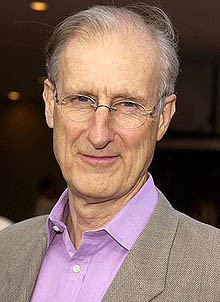James Cromwell Sum of all Fears, Spirit: Stallion of the Cimarron

THE POLITICAL SPIRIT OF JAMES CROMWELL
EXCLUSIVE James Cromwell/Sum of all Fears, Spirit: Stallion of the Cimarron Interview by Paul Fischer in Los Angeles.
James Cromwell is as larger-than-life off screen as he is on. The Oscar nominee for the hit film "Babe", has played his share of powerful figures, more recently as the voice of the determined Colonel Custer in the animated "Spirit: Stallion of the Cimarron", or a seriously flawed US President in "The Sum of All Fears". Yet ask Cromwell, an outspoken political and social activist, about any political aspirations of his own, the quietly taciturn actor flinches with anger at America's political system. "I think the system is corrupted and simply does not work," Cromwell says. "We are not learning the truth, they are not addressing the issues, servicing their constituents, which are large corporations, that pay for their elections. There are wonderful, principled men in Congress who I really admire but they have to work in a system that to me just doesn't work."
Cromwell has less time for current US President Bush, a man, he insists "has no mandates, who was not elected by the majority of the people yet is President of the United States, and making the most profound changes we have ever had in foreign policy. But certainly in terms of the environment, international justice, the world court and the bench," the actor insists.
In "The Sum of All Fears", Cromwell plays a flawed President whose emotions are put to the test when he almost catapults America into a distinctly possible nuclear war. While there are no parallels between Cromwell's fictional President Fowler in "Sum of All Fears" and George W. Bush, Cromwell does express his own views about the latter's handling of military events in the aftermath of September 11. "I hoped that there would be a measured response, that we wouldn't go over and kill a lot of innocent Afghani's. I think under the circumstances, maybe they handled it better than they've handled other things, though I hate the secrecy of the war. For instance, has anyone ever asked how many people we have killed on the ground? No one asks, nor will they ever ask. Does anybody know what happened to that American kid? Is that trial going forward? Does anybody know the names of the people whom we have incarcerated who are all material witnesses, whether that suit will go through the federal court, there's a lot of issues still outstanding."
Cromwell is genuinely passionate in his political views, and admits that had it not been for his relatively recent ascension to Hollywood star, nobody would be listening, he says smilingly. "I was never shy about commenting on these things; it's just that no one would listen. Now people listen to some degree, so if I can raise some awareness, shine a little light on some of the darker corners, it's a big plus."
It was a pig called Babe that transformed the once unknown Canadian native into one of America's most sought after character actors. Cromwell was 55 when he landed the role of Farmer Arthur Hoggett in the now classic Aussie film. Despite having acted for some 20 years prior to "Babe", this film brought him fame and an unexpected Oscar nomination, none of which he ever imagined while shooting the film in rural Australia.
"I remember I was doing some looping for "Babe" and an engineer told me how much he really liked my performance in "Babe" and added that's an Academy Award nominated performance. I said, 'I thought it was a joke'. But he said 'no, no'. I said that it's got no lines. He said 'believe me, it is'. So I thought that I will probably never get an opportunity like this again." So Cromwell decided to orchestrate his own Academy campaign without any help. "I paid for my own advertisement, it cost me a great deal of money, I really thought that it's the only chance I will probably ever get and somebody thought that maybe it would work out. It was completely unexpected when I heard that the film had been nominated. I was really pleased and the publicist said and you're nominated too, didn't you know? And I was flabbergasted."
The gamble paid off and Cromwell hasn't looked back since. The film's huge international success and his Oscar nod, led Cromwell to be cast in the distinctive "L.A Confidential", and remains one of the consistently hardest working actors in town thanks to that one little pig. "You know if you are going to have a career in this business, you have to get in the club and it was always my intention to enter the club." The club continues to be kind to Cromwell, who doesn't allow his political viewpoints necessarily affect his choice of role. While he may be diametrically opposed to the politics of his "Sum of all Fears" president, the actor found enough substance in the material for him to accept the role. "I thought in that film that it was interesting that the Russian premier was the more sensible of the two leaders. I also thought the idea that my character was so full of himself at the beginning is overwhelmed by what happens to him. That to realize that we let these decisions happen at that level rather than handling the root causes before they ever degenerate into this and that the mechanism does not work particularly well. Some people would say nothing about it and it works like gangbusters."
Despite Cromwell's politics, the actor didn't borrow any traits from real-life presidents. "I thought he was a fictional character and developed in the script, so basically what I was interested in, was the man behind the Office. The President is always referred to as MR President and that's what you see on television. You don't see the guy who chokes on the pretzel and that is what interested me. What's HE like? What does he say? What does he feel? The character was frightened, belligerent, hostile, knee-jerk, ignorant and misguided. Therefore very human," Cromwell adds.
Prior to audiences seeing Cromwell playing President, they will hear him as another belligerent character, the self-determined cavalry colonel in the animated "Spirit: Stallion of the Cimarron". Cromwell is as passionately interested in Native American social politics, ironic given his character's treatment of the Native American people in "Spirit". But Cromwell was attracted to a film "where for the first time I had to rely on my voice alone, which was strange to me, since I'm such a physical actor," Cromwell explains. "I find it difficult to nuance a performance. I'm very good at picking out voices. You listen to Hackman's voice or Dreyfuss' voice, they are not trained to do it either, they can't do what a real voice-over actor can do. But when you hear Tom Hanks and all those people do those things, they're just doing their acting and they animate the character so I thought well maybe this will work. People say that there is something distinctive about my voice. I have no idea whether that is true or not. Well if there is something distinctive about it maybe I can bring that to a character, I don't know who this guy is really, I sort of make him up. This is how I would play him if I was playing him on the screen."
Yet in doing the film, a return to a more conventional form of big-screen animation, Cromwell, who also raises horses, ensured that the film would be fair in its depiction of both horse and Native American. "I had a meeting with them before I agreed to do the film and they were very sweet, taking and showing me all the rough stuff they had." Cromwell has a particular interest in the Lakota Indians, the tribe of which is depicted in "Spirit". Cromwell urged DreamWorks boss Jeffrey Katzenberg to allow the film's young Lakota protagonist to speak in his native tongue. "I said that it would really be important given the fact that they are only one generation from losing their language. To hear the language spoken and it doesn't make any difference because you know what he was saying, just the same way you would know the horse and he listened, and the two producers really wanted it to happen. I told them that it is unfortunate that the Indian boy speaks English, which they knew. I think it would have been extraordinary had the studio had the courage to do that."
Cromwell's activism is about to bear fruit. Determined to put his money where his mouth is, Cromwell recently adapted a book by James Welks called "The Death of Jim Mooney", which he will both produce and co-direct. Cromwell defines his company as one designed "to create work that probes the interface between indigenous cultures and European cultures. I don't want to make indigenous films because I am not indigenous; I'm not an Indian. But I can make films about what happened in terms of Indians, I could make "Dances with Wolves" but I wouldn't", Cromwell concludes smilingly.
Order Now from Dstore
Order Now from Top Shop
Order Now from Chaos
Order Now from Sanity
MORE
- Viggo Mortensen The Road
- 24 Cast Reunion
- Aaron Eckhardt No Reservations
- Aaron Eckhart The Dark Knight
- Adam McKay Step Brothers Interview
- Alan Alda Diminished Capacity Interview
- Alan Alda Diminished Capacity Interview
- Alex Dimitriades
- Al Pacino Oceans 13
- Alan Rickman Snow Cake
- Alan Rickman Sweeney Todd



